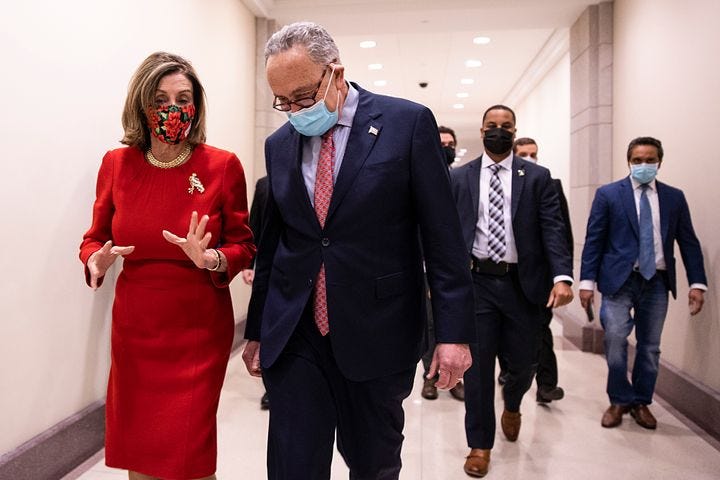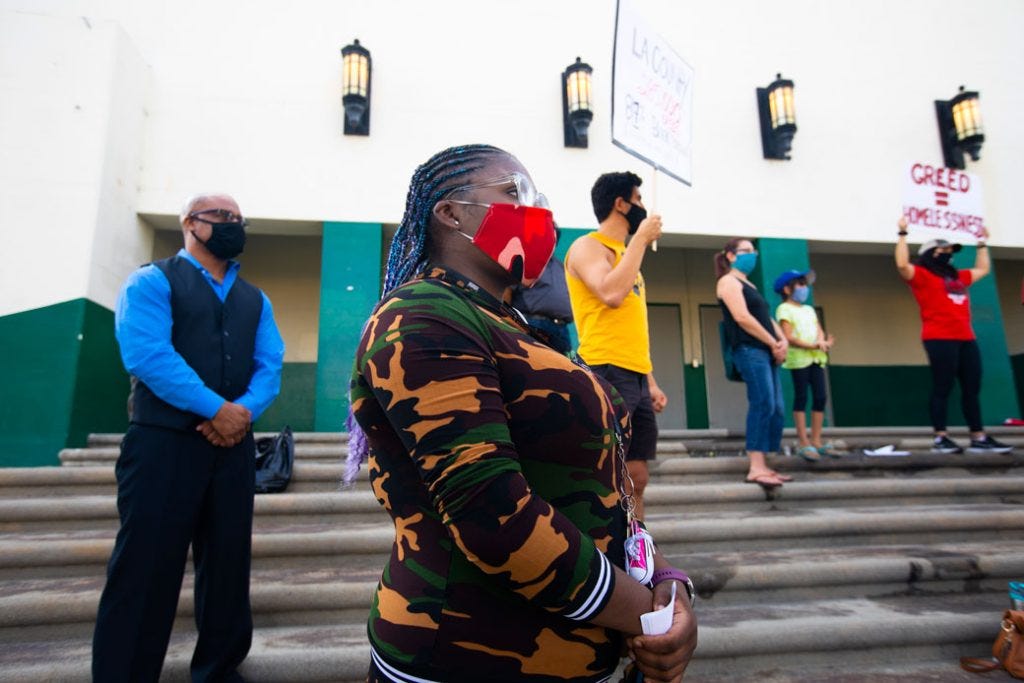It is so easy to disagree these days (e.g. vaccine sequencing, reopening schools, public funding). However, the way that we, as individuals, choose to respond to conflict under mounting pressure shines light on both our personal character and the symptoms our community faces at-large.
Friday was a big day for the state of Oregon. Governor Kate Brown visited Portland and shared her letter announcing that all Oregon public school students must have the option to return to the classroom within the next month, taking into consideration the health and safety metrics already established. This news landed with a rush of mixed emotions for families, students, teachers, and community partners across our state. Many of us interpret our rapidly changing environment through a very personal, introspective lens. But it is also important to balance our own introspection with the lived-experiences of our neighbors. There are so many locally driven nuances regarding the feelings, politics, and scaffolding involved in creating prosperous communities post-COVID. I have three suggestions for ways that we can dig into the nuance to ensure we are not truncating the work:
1. Be inclusive. Many of us consider ways to be inclusive in our daily work. Unfortunately, these efforts can come across as more transactional than transformative in some cases. Today, with so many divisive topics flying around the media and online, it is critical that being inclusive actually means we are inviting everyone to share their perspective, especially if it is different from our own.
2. Be expansive. Inviting diverse perspectives is only the first step. Secondly, it is important to actually expand your own perspective so that you can make space for new ideas. The truth is that any difficult decision requires tradeoffs that are layered and complex. It is important for us to do that hard work of sitting in conflict with one another and discussing the implementation and outcomes of each tradeoff.
3. Be adaptive. Finally, once we have identified and discussed tradeoffs, we must actually be ready change. What our communities, families, schools, and students have relied on as fact and reality for many years may be in the process of evolving right before our own eyes. It is uncomfortable, it may feel like a personal attack, but (as I said in the beginning) the way we choose to show up under pressure has the capacity the revolutionize our community. In this moment our future generations are going to ignite and inspire greatness and our leaders and systems must be ready to respond accordingly.
FEDERAL POLICY AND FUNDING
This weekend resulted in a game changing moment for US students and families. The Senate passed President Biden’s American Rescue Plan that includes maintenance of equity provisions, broadband access, strategic expansion of Americorps for equity focused academic supports, money for supporting reopening schools, as well as funds intended to address learning acceleration and social and emotional development. Important line items include $126B to support K12 school reopening and academic scaffolding, $800M for students experiencing homelessness, and $2.7B for governors’ responses to the pandemic. Now our communities rely on the House to quickly vote on the bill, sending it to the President’s desk by mid-March.
COVID Relief and Recovery and FY22 Appropriations | Knowledge Alliance
7 crucial principles for investing ESSER funds for sustainable impact | ERS
Coalition Letter to Congressional Leaders on Federal Funding | AASA
COVID-19 Relief Package Heads To Senate As Debate Over Minimum Wage Continues | NPR
Education Secretary Miguel Cardona: Here's my five-point plan to get students back in school full time | USA Today
What Congressional Covid Funding Means for K-12 Schools | FutureEd
STATE AND LOCAL EDUCATION POLICY
For over a year, our state and local leaders have been making rapid decisions regarding the COVID-19 pandemic and scaffolding supports for our educators, students, and families. To date, we have not seen stories of broad educator reduction-in-force efforts, but we must continue to brace for future economic forecasts to ensure our educator job market remains intact. That said, it is exciting to watch community-organizers rally to protect our diverse teacher workforce as we reimagine an education system post-COVID.
During the pandemic, ‘lost’ education jobs aren’t what they seem | Brookings
Philadelphia educator starts national project to find more Black teachers | Chalkbeat
School districts can determine mask policies, can’t mandate vaccines, Texas Education Agency says | TEA
REOPENING SCHOOLS
If November and December represented the churn of schools reopening and closing, it seems that this spring will represent the return. Federally, Secretary Cardona penned an op-ed this week outlining his plans to build momentum towards reopening schools across the nation this spring. Executive leadership like this is so important because it sets a clear path for state and local leaders to create the social policy infrastructure necessary to implement national and statewide plans.
This moment calls for radical care for all our children | EdScource
Education Secretary Cardona: Here is my plan to get students back in schools full-time | USA Today
8,000 districts point to 5 trends in instructional offerings | AEI
TEACHING AND LEARNING
Over the past year of turmoil around school closing and reopening many of us have learned how we’ve taken for granted and misunderstood the ways our students were physically in our classrooms and hallways. Ironically, in order for us all to finally center students we first had to completely remove them from buildings. Now, we have the charge to redefine the way that we expect students to engage in the learning process in and out of school-time.
Young Children's Care and Education Before Kindergarten | IES NCES
5 Ways To Include Student Voice in Education Policymaking | CAP
What is Vertical Coherence and Why Does it Matter for Equity? | Getting Smart
We’re missing a staggering amount of information around early care and education – here’s why that needs to change | Bellwether
Leveraging Educator Micro-Credentials to Meet the Moment | ECS
ASSESSMENT AND ACCOUNTABILITY
There are layers of misunderstanding and misuse undergirding the tension that federal and state education leaders face in decisions around assessment and accountability this spring. Specifically, the intergenerational harm caused by the misuse of standardized testing for Black, Indigenous, and Latinx US communities is critical pressure point undergirding many debates, as well as the residue many educators experience from high-stakes test scores uses in our post-NCLB era. The truth is that US school systems have not spent the time rebuilding relational trust across stakeholders, re-educating critical decisions makers, and redefining a more cohesive and balanced culture regarding school improvement, assessment, and the many types of school accountability.
Assessments by State | Assessment HQ
Tough Test: The Nation’s Troubled Early Learning Assessment Landscape | FutureEd
Year-End Assessments Survey | National PTA and Learning Heroes
Pandemic offers opportunity to reduce standardized testing | PDK
UPCOMING EVENTS
Tuesday, March 9 (10AM EST) — The Senate Health, Education, Labor and Pension Committee is holding a hearing on “Examining Our COVID-19 Response: An Update from the Frontlines.” You can stream here.
Wednesday, March 10 (12:30PM EST) — Results for America hosting congressional briefing on “How Local Communities Are Using Evidence and Data to Fight COVID-19, Get the Economy Back on Track and Support Kids in School.” RSVP here.
Thursday, March 11 (10:30AM EST) – The House Committee on Energy and Commerce is holding a hearing on "Kids Online During COVID: Child Safety in an Increasingly Digital Age". You can stream here.
Dr. Christine M. T. Pitts serves as Manager of Research and Evaluation at Portland Public Schools. As an Oregonian, raised by a multicultural family of educators, she brings over a decade of progressive strategic leadership experience, a transformative vision, and analytic skill to crafting state education policy. An educator and researcher by training, she has conducted legislation, governance, and policy analyses on a wide array of education issues using social network analysis and mixed methods research. In addition, Dr. Pitts is a facilitative leader who deeply understands and co-constructs local and national partnerships across stakeholder groups. Dr. Pitts currently coordinates between state and national policy leaders to investigate and advocate for policies that prioritize racial equity in education. Christine lives with her husband and four children in Portland, Oregon. Follow her on Twitter @cmtpitts.










